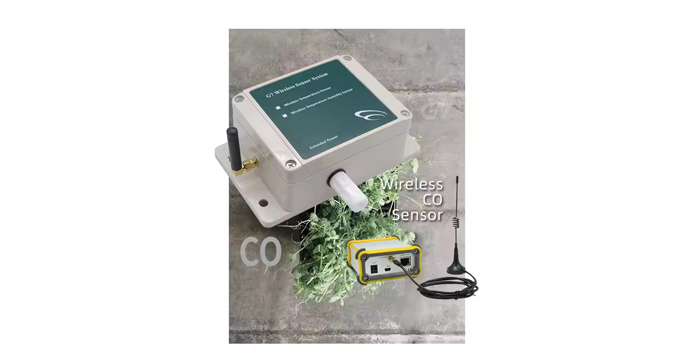
Carbon Monoxide (CO) Sensors: Protect Against the Silent Killer
Pioneer provides reliable carbon monoxide (CO) sensors and detectors to protect people and property from the dangers of this colorless, odorless, and potentially deadly gas. Early detection of CO is crucial for preventing poisoning and ensuring safety.
The Dangers of Carbon Monoxide
Carbon monoxide is produced by the incomplete combustion of fuels such as natural gas, propane, gasoline, oil, wood, and coal. Common sources of CO include:
- Faulty furnaces, boilers, and water heaters.
- Gas appliances (stoves, ovens, dryers).
- Fireplaces and wood stoves.
- Generators.
- Vehicles running in enclosed spaces.
CO poisoning can cause a range of symptoms, from headaches and dizziness to nausea, unconsciousness, and even death. Because it is undetectable by human senses, CO is often called the "silent killer."
Types of CO Sensors
- Electrochemical CO Sensors: The most common type, these sensors use a chemical reaction to generate an electrical current proportional to the CO concentration.
- Semiconductor CO Sensors: Use a metal oxide semiconductor that changes resistance in the presence of CO.
- Biomimetic CO Sensors: Mimic the way hemoglobin in blood reacts to CO.
Applications
- Residential: Homes, apartments, and other living spaces.
- Commercial Buildings: Offices, schools, hospitals, hotels, and other public buildings.
- Industrial Facilities: Manufacturing plants, warehouses, and other workplaces where combustion processes occur.
- HVAC/R: Monitoring CO levels in heating systems.
- Parking Garages: Detecting CO buildup from vehicle exhaust.
- Recreational Vehicles (RVs) and Boats: Protecting occupants from CO poisoning.
Key Features to Consider
- Accuracy and Sensitivity : Choose a sensor that meets relevant safety standards (e.g., UL 2034 for residential detectors).
- Alarm Level: The CO concentration at which the alarm will sound.
- Display: Some sensors have digital displays that show the CO concentration.
- Power Source: Battery-powered, hardwired, or plug-in.
- End-of-Life Indicator: Alerts you when the sensor needs to be replaced.
- Connectivity: Some sensors offer wireless connectivity for remote monitoring and alerts.
Why Choose Pioneer CO Sensors ?
Reliable Detection, Safety Certified, Easy Installation, Long-Lasting Performance, Expert Support, Competitive Pricing
| Specification | Details |
|---|---|
| Use/Type | Wireless CO sensor |
| Mounting Type | Wireless CO sensor |
| Model Number | G7-AD-CM |
| Series | Wireless CO sensor |
| Product Name | Gas sensor |
| Certificate | CE RoHS |
| Item | Sensor Mould |
| Waterproof Type | Waterproof |
| Material | Metal, waterproof |
| Application | Industrial |
| Display Type | Analog and Digital |
| Output | Digital Sensor |
| Usage | Temperature Sensor |
| Function | Programmable |
| Dimension | 115 x 90 x 55 mm / 70 x 65 x 35 mm |
Carbon Dioxide (CO2) Sensors: Monitor and Control CO2 Levels
Pioneer offers a range of carbon dioxide (CO2) sensors and monitors for measuring CO2 concentrations in various applications, including indoor air quality monitoring, ventilation control, and industrial processes. Maintaining optimal CO2 levels is crucial for comfort, health, and energy efficiency.
The Importance of Monitoring CO2
- Reduced Cognitive Function: High CO2 levels can impair concentration, decision-making, and productivity.
- Drowsiness and Fatigue: Elevated CO2 can cause feelings of tiredness and lethargy.
- Headaches and Dizziness: Common symptoms of high CO2 exposure.
- Poor Indoor Air Quality: High CO2 levels often indicate inadequate ventilation.
Monitoring CO2 levels is also important for:
Types of CO Sensors
- Demand-Controlled Ventilation (DCV): Optimizing ventilation rates based on occupancy and CO2 levels to save energy.
- Greenhouse and Grow Room Management: Maintaining optimal CO2 levels for plant growth.
- Industrial Processes: Monitoring CO2 in applications such as fermentation, brewing, and dry ice production.
Types of CO2 Sensors
- Non-Dispersive Infrared (NDIR) Sensors: The most common type of CO2 sensor, NDIR sensors use an infrared light source and detector to measure the amount of infrared light absorbed by CO2 molecules. They are highly accurate and reliable.
- Electrochemical CO2 sensors
- Photoacoustic CO2 sensors
Applications
- HVAC Systems : Demand-controlled ventilation, indoor air quality monitoring.
- Schools and Offices : Maintaining comfortable and productive environments.
- Greenhouses and Grow Rooms : Optimizing CO2 levels for plant growth.
- Breweries and Wineries : Monitoring CO2 levels during fermentation.
- Industrial Processes : Monitoring CO2 in various applications.
- Incubators : Maintaining optimal CO2 levels for cell culture.
Why Choose Pioneer CO Sensors ?
Measurement Range, Accuracy, Response Time, Output Signal, Calibration, Environmental Conditions
Why Choose Pioneer CO2 Sensors ?
Accurate and Reliable Measurement, Wide Range of Options, Easy Integration, Expert Support, Competitive Pricing
| Specification | Details |
|---|---|
| Type | Fixed gas detector |
| Customized Support | OEM, ODM, OBM |
| Infrared Resolution | Other |
| Thermal Color Palettes | Other |
| Material | Food Grade Stainless Steel, 316L stainless steel, 1.5mm thick |
| Power Supply | 16~28VAC/16~35VDC |
| Resolution | ±0.1 engineering unit |
| Display | Parallel or alternatively display input channels 1 to 3 |
| Built-in Sensor | Built-in T/RH+DP sensor |
| Analog Input | Max. 3x (4~20mA/0~10V) |
| Analog Output | Max. 3x (0~10V) |
| Working Environment | 0-50℃, 0-95%RH (no cond) |
| Default Input | 0-10V |
| Panel Type | Mini/Horizontal/Vertical |
